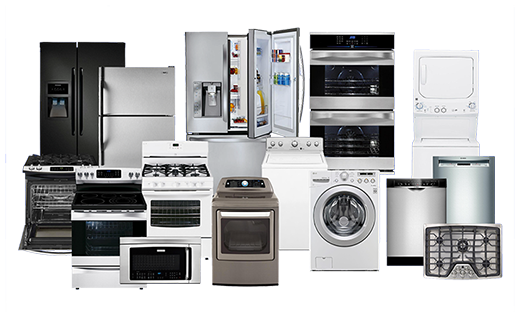What to Check When Your Fridge Isn’t Cooling – Dependable Refrigeration & Appliance Repair Service Washing Machine Repair
What to Check When Your Fridge Isn’t Cooling – Dependable Refrigeration & Appliance Repair Service Washing Machine Repair
Blog Article
A Comprehensive Look at DIY Device Repair Work for Homeowners
If you have actually ever encountered a malfunctioning home appliance, you know exactly how frustrating it can be. Comprehending typical problems and using the right troubleshooting methods can conserve you money and time. With the right devices and a bit of knowledge, you could deal with minor repair work yourself. But when do you understand it's time to hire a specialist? Allow's explore the basics of DIY device repair and what you need to keep your home running smoothly.
Understanding Usual Appliance Issues
When your appliances start acting up, it can feel overwhelming, specifically if you're unsure what the issue is. Common problems typically occur with refrigerators, washers, and clothes dryers, and understanding what to seek can save you time and anxiety. For instance, if your refrigerator isn't cooling, examine the temperature settings or listen for uncommon audios that might indicate a stopping working compressor.With washing equipments, leaks typically originate from worn hose pipes or faulty door seals. If your dryer isn't heating, a clogged vent could be the wrongdoer.
Essential Devices for Do It Yourself Repair Works
Having the right devices can make all the distinction in your DIY home appliance repair initiatives. Begin with a reliable toolset that consists of screwdrivers-- both flathead and Phillips-- considering that several devices utilize these kinds of screws. A sturdy set of pliers is vital for clutching, turning, or reducing cables. You'll likewise want a socket set for removing bolts and nuts that hold home appliances together.A multimeter is essential for examining electric connections and identifying issues. Do not neglect a level to ensure your home appliances rest properly, as this can impact efficiency. Take into consideration spending in a torque wrench for certain tightening up demands. An excellent flashlight or work light will aid you see right into tight or dark areas. With these tools in hand, you'll be well-appointed to take on most DIY appliance repairs with self-confidence.
Troubleshooting Methods for Devices
Before diving into repair work, it is important to identify the problem affecting your device. Beginning by observing any type of unusual noises, leakages, or error codes. Remember of when the issue happens-- does it happen during details cycles or under certain problems? This can provide clues.Next, consult the customer guidebook for fixing tips. Several devices consist of a fixing section that could address your issue straight. Online sources, online forums, and videos can likewise supply important insights.If you can, perform simple examinations: for a washing equipment, check if the door lock is involving correctly; for a fridge, see if it's preserving the ideal temperature.Lastly, don't neglect to inspect power sources-- guarantee your appliance is plugged in which circuit breakers are operating. By systematically limiting the issue, you'll be better furnished to take on the fixing successfully.
Step-by-Step Fixing Guides for Major Equipments
While you could really feel daunted by the idea of fixing major devices, following a clear step-by-step guide can make the process convenient. Start by determining the trouble-- this could be anything from a refrigerator not cooling to a washing maker not rotating. Once you have actually determined the issue, collect the necessary tools like screwdrivers, pliers, and a multimeter.Next, consult your device's manual for particular guidelines and representations. This resource can be very useful for understanding exactly how to dismantle and rebuild your appliance safely. Start the repair by unplugging the system and getting rid of any kind of panels or covers. Very carefully check parts, changing any type of malfunctioning components as needed.After you've completed the repair, rebuild the device and test it to verify whatever works appropriately. Ultimately, maintain a document of your fixings for future referral. With practice, you'll gain confidence in tackling much more complex concerns.
Safety Tips for Appliance Repair Work
Before you begin any kind of home appliance repair service, see to it you're outfitted with the appropriate individual protective equipment like gloves and safety and security goggles. Constantly disconnect the home appliance or shut off the power source to stop any crashes. Remaining secure is equally as important as completing the fixing itself.
Personal Safety Tools
When tackling device repair, it is crucial to prioritize your security by using the appropriate personal safety equipment (PPE) Begin with security goggles to shield your eyes from particles and possible sprinkles. Next off, use gloves to secure your hands from sharp sides and dangerous materials. Relying on the appliance, you could likewise need a dirt mask to stay clear of inhaling dust or fumes. Durable shoes is important, also; select closed-toe footwear to stop injuries from hefty items. Consider utilizing knee pads if you'll be working on the flooring for extensive durations. By equipping yourself with appropriate PPE, you'll minimize dangers and focus on the job at hand, ensuring a much safer and extra effective fixing process.

Source Of Power Precautions
Making sure that a device is disconnected from its source of power is necessary for your safety throughout repair work (Dependable Refrigeration & Appliance Repair Service Dryer repair near me). Before you start, disconnect the device or switch off the circuit breaker. This easy step avoids electric shocks or crashes. Constantly double-check that the power is off using a voltage tester-- do not rely on assumptions! If you're dealing with bigger devices, take into consideration making use of a lockout/tagout system to avoid accidental awakening. Keep your job location completely dry and clear of clutter to lessen risks. Use shielded gloves and use devices with rubber grips to supply extra security. Ultimately, never effort fixings in wet problems, as water and electrical power don't mix. By following these safety measures, you'll develop a much safer atmosphere for your DIY repair project
When to Call a Professional

Safety And Security Problems Initially
Although taking on DIY device fixings can be satisfying, it's vital to acknowledge your restrictions and focus on security. If you run into any type of signs of electric problems, like sparks or unusual scents, stop promptly and call an expert. Do not attempt repairs entailing gas lines or complicated electrical wiring unless you're thoroughly educated. Always disconnect appliances prior to servicing them, and use protective gear to protect yourself from prospective hazards. If you're not sure concerning a repair service or really feel overwhelmed, seeking professional assistance is the most effective choice. Your safety is more vital than saving a couple of bucks. Keep in mind, some repairs can bring about serious injury or additional damage to your device otherwise dealt with properly. Depend on your instincts-- when doubtful, connect for professional aid.
Complex Fixing Issues
When appliances breakdown past basic problems, it's often best to call in a specialist. If your fridge isn't cooling down, your cleaning equipment won't rotate, or your stove won't heat up, these problems can signal a lot more intricate more info issues. Attempting to take care of these by yourself can result in additional damages or safety and security threats. You might experience electric troubles, unusual noises, or leaking fluids that require specialized knowledge and devices. If you're unclear concerning the fixing procedure or do not have the required experience, do not wait to connect for specialist aid. It can save you time, money, and the stress of experimental fixes. Relying on a certified service technician assurances your appliances are restored securely and successfully, permitting you to return to your everyday routine.
Warranty Considerations
Prior to attempting any repairs, it is essential to check if your device is still under service warranty. If it is, you may intend to avoid DIY repair work altogether. Making alterations or opening the device might void the service warranty, leaving you in charge of future repairs. Instead, connect to the supplier or licensed service facility for expert aid. They commonly have actually trained technicians that can identify and deal with issues promptly. If your home appliance runs out guarantee and you feel confident in your abilities, you can wage do it yourself repair work. Nonetheless, if you're unsure or face intricate issues, calling an expert is normally the much safer selection. Keep in mind, purchasing specialist assistance can save you time and stop additional damages.
Preserving Your Appliances for Long life
To guarantee your home appliances offer you well for several years to find, normal maintenance is essential. Begin by cleansing your devices regularly; dirt and particles can develop up and impede efficiency. For refrigerators, check the door seals and tidy the coils to maintain them efficient. Laundry your cleaning equipment's drum and dispensers to stop mold and mildew and odors.Don' t neglect to check hose pipes and connections for leakages or put on. For dishwashing machines, run a cleansing cycle month-to-month to validate proper drainage and get rid of odors.Keep an eye on any type of unusual sounds or performance concerns-- addressing these early can avoid expensive repair services down the line (Washer dryer repair service Dependable Refrigeration). Ultimately, describe your home appliance handbooks for particular maintenance tips and advised solution intervals. By adopting these techniques, you'll not just prolong the life of your appliances but additionally improve their performance, conserving you time and money over time
Regularly Asked Concerns
What Home appliances Are Many Commonly Fixed by Home Owners?
When it pertains to DIY fixings, house owners typically tackle washing equipments, clothes dryers, refrigerators, and dishwashing machines. You'll find these devices are most commonly repaired given that they regularly experience concerns and can be convenient with basic tools.
How Can I Find Appliance Repair Components Quickly?
You can locate appliance repair service parts quickly by browsing online merchants, checking out local equipment shops, or examining maker sites. Do not neglect to have your appliance model number useful to assure you obtain the right parts.
Exist Online Resources for DIY Device Repair Videos?
Yes, there are plenty of on the internet sources for DIY home appliance repair service videos. YouTube is a wonderful start, together with websites like RepairClinic and AppliancePartsPros, which use detailed overviews to aid you troubleshoot and repair your appliances.
What Common Mistakes Should I Prevent During Fixes?
Throughout fixings, stay clear of rushing your work, skipping security preventative measures, or overlooking to check out handbooks. Do not think you recognize every little thing; request for aid if required. Always keep your work space arranged to avoid shedding devices or components.
Exactly How Can I Tell if a Part Deserves Repairing?
To identify if a part's worth repairing, analyze its cost compared to substitute. Examine availability, ease of repair, and whether the appliance's total value justifies the initiative. If repairs set you back extra, take into consideration replacing it instead.
Report this page